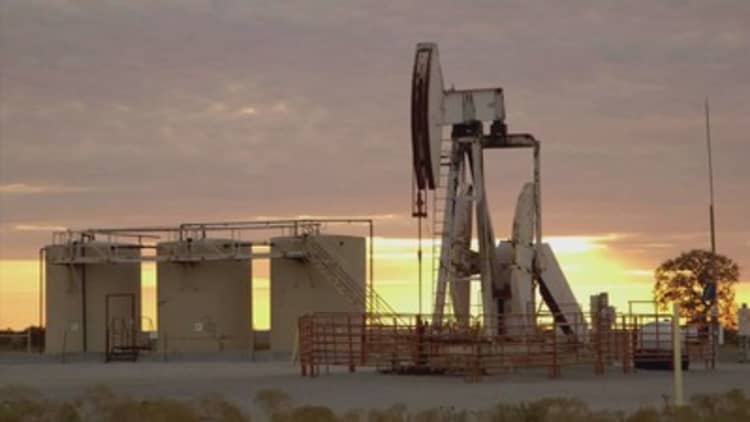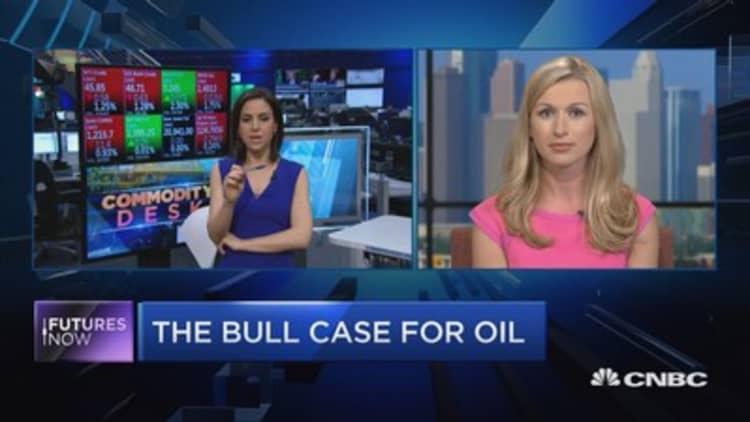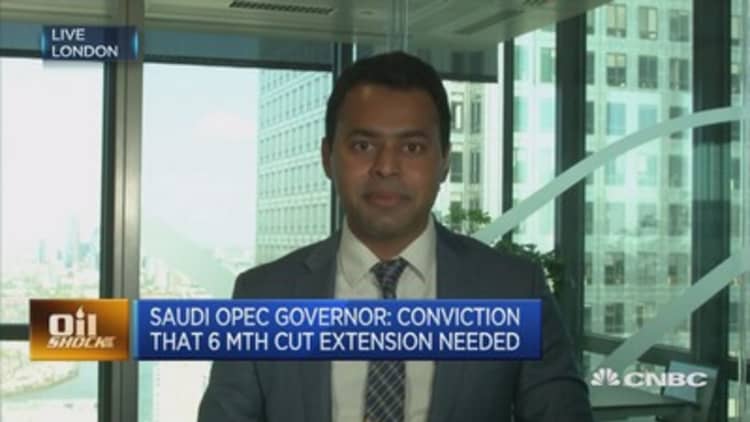
Oil prices fell on Tuesday, rattled by concern over slowing demand, a rising U.S. dollar and increasing U.S. crude output that has shaken investors' faith in the ability of OPEC to rebalance the market.
Brent crude futures were down 49 cents, or 1 percent, at $48.85 per barrel at 2:37 p.m. ET (1837 GMT). U.S. West Texas Intermediate futures fell 55 cents, or 1.2 percent, to $45.88 a barrel.
So far this week, the U.S. dollar has gained about 1 percent against a basket of currencies as it rises to its highest since April 21, pressuring greenback denominated oil.
On Tuesday, the Energy Information Administration raised its U.S. oil production forecast for both this year and next. The agency now sees U.S. output averaging 9.3 million barrels a day in 2017, and and nearly 10 million barrels a day in 2018.
EIA also revised down its projection for average oil prices in 2017 to $52.60 a barrel for Brent and $50.68 for WTI.

"Higher oil production from the United States, along with rising oil output from Canada and Brazil, is expected to curb upward pressure on global oil prices through the end of 2018," EIA Acting Administrator Howard Gruenspecht said in a statement.
Top exporter and de facto OPEC leader Saudi Arabia said on Monday it would "do whatever it takes" to rebalance a market that has been dogged by oversupply for over two years.
State oil giant Saudi Aramco will cut oil supplies to Asia by about 7 million barrels in June, a source with direct knowledge of the matter said.
Tanker tracking firm ClipperData reports that Saudi Arabia's crude oil loadings for export fell by about 670,000 barrels a day in April from October, the reference period for OPEC's output cut deal. That is significant because OPEC's exports have remained elevated despite its production cuts, limiting the group's ability to shrink stockpiles around the world.
"We really need to see some of the data starting to support the idea that global inventory levels are coming down," Saxo Bank senior manager Ole Hansen said.

"Almost as importantly, there have been some signs that there has been some wavering in terms of demand growth."
Weekly U.S. data on crude production and inventories, plus a monthly report on supply and demand from the Organization of the Petroleum Exporting Countries, should provide a detailed picture of how quickly global crude inventories are falling.
Analysts forecast U.S. crude stocks declined for a fifth week in a row, falling 1.8 million barrels during the week ended May 5, after hitting an all-time high over 535.5 million barrels at the end of March, according to a Reuters poll.
High U.S. gasoline stocks have fed some concern about demand in the United States, where consumer spending expectations hit a three-year low last month and vehicle sales have fallen year-on-year for four months in a row.
Coupled with that is faltering manufacturing activity and a drop in commodity imports in China, the world's second-largest economy and biggest raw materials consumer.
Even though OPEC has stuck to its pledge to cut production, U.S. output has risen by more than 10 percent since mid-2016 to 9.3 million barrels per day, close to the output of Russia and Saudi Arabia.
"U.S. oil production surpassed expectations in terms of an early bottoming and swift uptick, and is set to expand further based on the latest drilling momentum," said Norbert Ruecker, head of macro and commodity research at Julius Baer.
"We see prices between $45-50 per barrel as fundamentally justified. Consequently, we have raised our view to neutral from bearish and closed our short position. An extension of the supply deal beyond June looks likely but its effectiveness will remain questioned."
On the physical markets, barrels of North Sea crude changed hands at their lowest levels since late 2015 on Monday.
— CNBC's Tom DiChristopher contributed to this report.

